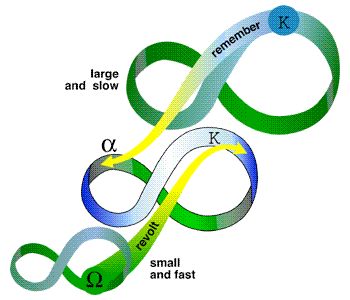“Why of course the people don't want war. Why should some poor slob on a farm want to risk his life in a war when the best he can get out of it is to come back to his farm in one piece? Naturally the common people don't want war: neither in Russia, nor in England, nor for that matter in Germany. That is understood. But after all it is the leaders of a country who determine the policy and it is always a simple matter to drag the people along, whether it is a democracy or fascist dictatorship, or a parliament or a communist dictatorship. Voice or no voice, the people can always be brought to the bidding of the leaders. That is easy. All you have to do is tell them they are being attacked, and denounce the peace makers for lack of patriotism and exposing the country to danger. It works the same in any country.” -- Hermann Göring, one of the most powerful figures of the Nazi party.
I have always wondered what were the environmental impacts of war. Because the human costs of war are so great, they triumph over any environmental considerations. But the legacy impacts of war on human health and ecosystem is a nontrivial consequence. For example, during the Vietnam War, the United States military sprayed Agent Orange to defoliate jungles and ruin cropland, resulting in millions of people being exposed to the toxicity of the herbicide, and a legacy of pollution and disruption of the ecological food chain till this day. Not to mention, nuclear blasts and testing release massive quantities of energy and radioactive particles, causing far-reaching contamination of land and water around the site.
Named after the hair colour on Clementine...
From a cursory google search, I found one paper on the Environmental Impact of War and Terrorism, written in 2003 by a professor at the University of Reading, who is now retired. (I actually wanted to look for her when I was in Reading. I thought it would make for a fun celebrity-hunting adventure, Min Green style.)
I wanted to chase Dr. Mannion like Min Green chased Lottie Carson
The paper discussed how war and terrorism have changed human landscapes, such as in destroyed cities, in the establishment of camps for refugees and enemies, and in graves and memorials. War and terrorism also results in lasting ecological consequences such as degradation of agricultural land, pollution of air and water, and biodiversity loss.
Perhaps it might be more realistic to rally environmentalists around global peace-building efforts, instead.
Peace and sustainability are both rather hippie ideas
My counsellor, Liz, 是个丰满的黑人大妈 with a hearty laugh. She is also very wise. Because I am currently engaged in conflict with my supervisor, she pointed me towards a powerful little book of Conflict Transformation, which not only brought me comfort, but also got me fascinated about the transformational lens on conflict, as I can now see conflict, and the potential of this book's concept, everywhere. The writer, John Paul Lederach, believes that peace is not a static state, and that peace work is characterized by intentional efforts to address the natural ebb and flow of human relationships through nonviolent approaches.
Conflict transformation focuses on productive change, and change can be thought of as a circle:
The process of change, therefore, also involves things coming to a standstill, things moving backwards (3), and things going through a complete breakdown (4). These are necessary in order for things to move forward (1).
Illustration of conflict as a process-structure, and the need to establish creative platforms for addressing content, context, and underlying patterns and structures of the relationship
It may help, then, to conceive of conflicts as episodes, or the visible expression of conflict rising within the
relationship or system. The epicenter is the web of relational patterns from which new episodes and issues emerge. Conflict transformation addresses both the episode and the epicenter of conflict. In this view, escalation, for example, may be a necessary process in pursuit of constructive change.
Actually, this diagram reminds me of the Panarchy diagram for complex social-ecological systems, which explains the four phases of the adaptive cycle, and connects cycles in nested hierarchies:
It is difficult to pull apart the challenges for human society from the challenges for sustainability. I am brought back to my interest in the work of SIPRI (Stockholm International Peace Research Institute). I spent some time perusing their publications on armed conflict and peace processes, as well as on armament and disarmament, which is a major research stream. Their Yearbooks also contain an economic lens on war and peace: military spending, international arms transfer, and peace operations budgets.
The transparent bookkeeping and analyses on armed conflict and peace work by SIPRI is a vital contribution to our collective knowledge and understanding on these issues. I feel inspired to join them.
While the type of violence that SIPRI's work is focused on is very visible, less visible is the systemic everyday violence that creates starkly inequitable societies. As both nuclear warfare and climate change are existential threats, the Peace & Planet Network tries to draw these links, and advocates for activists in human rights, environment, and nuclear abolition to work together to address the interconnected problems with the exploitative model of the economic system.
Conflict Transformation states that conflict cycles reinforce an environment of insecurity that threatens identity. And at the root of most conflicts are issues of identity, which protect a sense of self and group survival. And as the conflict transformation process-structure suggests, we must establish platforms of constructive change, address underlying patterns, and seek to increase justice. We must envision something better.
It is Celebrate Learning Week here at UBC, under Workplace Learning Ecosystem, and I have signed up for the sessions on Conflict Engagement. There is also a monthly Conflict Theatre Community that I have recently enrolled in. The workshop on Tuesday introduced the "Argument" and the "Polarity Map" as tools for exploring the pros and cons of a dilemma. The example used was whether we should continue working from home, or return to campus. The presentation also offered some insights on some of the constructive options we have for engaging in conflict, identified some of common ways of resistance that can be ineffective or even destructive, and what alternatives there are for leaders as well as resisters to facilitate engagement.
I love how conflict links to theatre, and how the science of rational arguments connects with the art of debate. I can't wait to learn more, and to put these ideas into practice.






























